- Home
- Nick Hornby
How to Be Good Page 4
How to Be Good Read online
Page 4
‘I mean, do you want me to leave home? Come and live with you? Run away with you? What?’
‘Blimey.’
‘ “Blimey”? Is that all you’ve got to say?’
‘I hadn’t really thought about all that, to be honest. I just wanted to see you.’
‘Maybe you should think about it.’
‘Right now?’
‘You do know I’m married with kids, don’t you?’
‘Yes, but . . .’ He sighs.
‘But what?’
‘But I don’t want to think about it right now. I want to get to know you better first.’
‘Lucky you.’
‘Why lucky?’
‘Not everyone has that sort of time.’
‘What, you want to run off with me first and find out about me later?’
‘So you just want an affair.’
‘Is this the right time to tell you that I’m staying here tonight?’
‘I beg your pardon?’
‘I booked a room here. Just in case.’
I drain my drink and walk out.
(‘What was that all about?’ he asks me the next time I see him – because there is a next time, and I knew there would be even as I was getting into the taxi that took me back to my husband and family. ‘Why did you walk out on me at the hotel?’ And I make some weak what-kind-of-girl-do-you-think-I-am joke, but of course there’s nothing much to joke about, really. It’s all too sad. It’s sad that he doesn’t know why I didn’t respond to his seedy nightclub-owner gestures; it’s sad that I end up convincing myself somehow that the man capable of making them is a significant and valuable figure in my life. We don’t talk about sad things, though. We’re having an affair. We’re having too much fun.)
When I get home, David has put his back out again. I don’t know that this will turn out to be a turning-point in our lives – why should I? David’s back is always with us, and though I’d rather not see him as he is now – in pain, lying motionless on the floor with a couple of books under his head and the cordless telephone, its battery in need of recharging (hence, presumably, no message on the mobile), balanced on his stomach – I’ve seen him like this often enough not to worry about it.
He’s even more angry than I was expecting him to be. He’s angry with me for being late (but so angry, luckily, that he isn’t really interested in where I’ve been or what I’ve been doing), angry with me for leaving him to cope with the kids when he’s incapacitated, angry that he’s getting older, and that his back troubles him more frequently.
‘How come you’re a doctor and you can’t ever fucking do anything about this?’
I ignore him.
‘Do you want me to help you up?’
‘Of course I don’t want you to help me up, you silly bloody woman. I want to stay here. I don’t want to stay here and look after two bloody kids, though.’
‘Have they had their tea?’
‘Oh, yes. Course. They had some of those fish fingers that climb under the grill on their own and cook themselves.’
‘I’m sorry if that was a stupid question. I wasn’t sure when your back went.’
‘Fucking ages ago.’
There is no careless use of the f-word in this house; it’s all done very, very carefully. When David swears like this in front of the children – who are only pretending to watch television, seeing as how their two heads swivel round immediately when they hear a word they shouldn’t – he is communicating to all of us that he is unhappy, that his life is terrible, that he hates me, that things are so bad he can no longer control his language. He can, of course, and does, most of the time, so I in turn hate him for his manipulation.
‘Shut up, David.’
He sighs and mutters under his breath, filled with despair at my prissiness and my lack of sympathy.
‘What do you want me to do?’
‘Put their tea on and leave me alone. I’ll be able to get up soon. If I’m allowed to rest it.’ As if I were about to ask him to limbo dance, or put a few bookshelves up, or take me upstairs to make love.
‘Do you want the paper?’
‘Already read it.’
‘I’ll put the radio on.’
So we listen to the arts review thing on Radio 4, and we listen to The Simpsons, and we listen to the fish fingers spitting under the grill, and I try not to tread on my husband while I long for hotel rooms in Leeds and Clerkenwell – not what went on in them, but the rooms themselves: their quiet, their bedlinen, their intimations of a better, blanker life than this one.
David spends the night on the futon in the spare room; I have to help him to take his clothes off, so I’m bound to end up thinking about needs and wants and rights and duties and men with boils in their rectums, although I don’t get anywhere. And then I go to bed and read the paper, and the Archbishop of Canterbury has written about divorce, and the grass-is-greener syndrome, and how he wouldn’t wish to deny anyone the right to end a brutal and degrading marriage, but . . . (Why is every newspaper full of stuff about me me me? I want to read about train crashes I haven’t been in, unsafe beef I won’t eat, peace treaties in places I don’t live; instead my eye is drawn to stories about oral sex and the breakdown of the contemporary family.) So I’m bound to end up thinking about brutal and degrading marriages, and whether I’m in one, and however hard I try to kid myself – ah, but the meaning of these words ‘brutal and degrading’ it’s different in our particular postal district, he calls me a silly bloody woman, he creates bad atmospheres when my family visit, he is consistently negative about things I hold dear, he thinks old people should stay in the seats specially designated for them on buses – I know, really, that I’m not. I’m neither brutalized nor degraded by my relationship with David; it’s just that I don’t really like it very much, and that is a very different kind of complaint.
What is the point of an affair, when it comes down to it? Over the next three weeks I have sex twice with Stephen, and I don’t come on either occasion (not that coming is everything, although it sort of would be in the long run); we spend time talking about childhood holidays, my kids, his previous live-in relationship with a woman who moved back to the States, our shared antipathy to people who don’t ask questions . . . Where does any of it get me? And where do I want to get anyway? It’s true that I haven’t talked to David about childhood holidays recently, for obvious reasons, but is that what’s really missing from my marriage – the opportunity to look into the middle distance and wax lyrical about the joys of Cornish rock pools? Maybe I should try it, just like one is supposed to try weekends away without kids and saucy underwear. Maybe I should go home and say, ‘I know you’ve heard this before, but can I repeat the story of how I once found half-a-crown under a dead crab that my dad had told me not to touch?’ But it was a dull story the first time, made palatable only by David’s endless fascination for absolutely anything that had happened to me before I met him. Now I would be lucky to get away with a sigh and an inaudible obscenity.
You see, what I really want, and what I’m getting with Stephen, is the opportunity to rebuild myself from scratch. David’s picture of me is complete now, and I’m pretty sure neither of us likes it much; I want to rip the page out and start again on a fresh sheet, just like I used to do when I was a kid and had messed a drawing up. It doesn’t even matter who the fresh sheet is, really, so it’s beside the point whether I like Stephen, or whether he knows what to do with me in bed, or anything like that. I just want his rapt attention when I tell him that my favourite book is Middlemarch, and I just want that feeling, the feeling I get with him, of having not gone wrong yet.
I decide to tell my brother about Stephen. My brother is younger than me, no kids, no relationship at the moment; I’m almost sure that he won’t judge me, even though he loves Molly and Tom and has even been out for a drink and the odd meal with David when I haven’t been around. We’re close, Mark and I, and I vow to trust what he says, respect his instincts.
Wha
t he says is, ‘You’re off your fucking head.’ We’re in a Thai restaurant in Muswell Hill, around the corner from where he lives, and the starters haven’t even arrived yet; I wish I’d saved the difficult part of the evening for later. (Except I didn’t think it would be difficult. How come I got that wrong? Why did I think my brother would shrug all this off? I’d imagined this whispery, jokey, conspiratorial chat over a cold beer and some satay sticks, but now I can see that this was a bit off the mark, and that my brother would be no sort of brother at all if he smiled and shook his head fondly.)
I look at him and smile feebly. ‘I know that’s what it must look like,’ I say. ‘But you don’t really understand.’
‘OK. Explain.’
‘I’ve been so depressed,’ I say. He understands depression. He’s what passes for a black sheep in the Carr family: a chequered employment history, unmarried, pills, therapy.
‘So write yourself a prescription. Go and talk to someone. I don’t see how an affair is going to help. And a divorce certainly won’t.’
‘You’re not going to listen, are you?’
‘Course I’ll listen. Listening isn’t the same as cheering you on, though, is it? You can get one of your girlfriends to do that.’
I think of Becca, and I snort.
‘Who else have you told?’
‘No one. Well, someone. But she didn’t seem to hear.’
Mark shakes his head impatiently, as if I am speaking in feminine metaphors.
‘What does that mean?’
I gesture helplessly. Mark has always envied my relationships with people like Becca; he would find it hard to believe that she simply smiled at me indulgently, as if I were a stroke victim babbling nonsense.
‘Jesus, Kate. David’s a friend of mine.’
‘Is he?’
‘Well, all right, not, like, my best friend. But he’s, you know, he’s family.’
‘And that means he’s got to stay family for ever. Because he’s your brother-in-law and you went out for a curry a couple of times. No matter what he does to me.’
‘What has he done to you?’
‘It’s not . . . what he’s done. Nobody we know does things. He’s just . . . He’s always down on me.’
‘Diddums.’
‘Jesus, Mark. You sound like him.’
‘Maybe you should divorce me, too, then. You can run away from everyone who doesn’t thoroughly approve of you every second of the day.’
‘He’s breaking my spirit. He’s grinding me down. Nothing’s ever right, I don’t make him happy . . .’
‘Have you thought about counselling?’
I snort, and Mark realizes that this is David we are talking about, and makes a Homer Simpson ‘Doh!’-type noise, and for a moment we are brother and sister again.
‘OK, OK,’ he says. ‘Bad idea. Shall I talk to him?’
‘No.’
‘Why not?’
I don’t say anything; I don’t know why not. Except that I didn’t want anything to leak out of this conversation into the real world. I just wanted my brother to come into this little weird bubble I’m in for an evening. I wanted empathy, not action.
‘What would make a difference to you?’
I know the answer to this one. I’ve thought about it, and I’m word-perfect.
‘I don’t want David to be David any more.’
‘Ah. Who do you want him to be, then?’
‘Someone different. Someone who loves me properly, and makes me feel good, and appreciates me, and thinks I’m great.’
‘He does think you’re great.’
I start to laugh. It’s not an ironic laugh, or a bitter laugh, although surely if there was ever a moment that justified bitter laughter it would be now; it’s a belly laugh. This is one of the funniest things I have heard for months. I am not sure of many things at the moment, but I do know, with every atom of my being, that David does not think I am great.
‘What? What have I said?’
It takes a while to compose myself. ‘I’m sorry. Just the idea that David thinks I’m great.’
‘I know he does.’
‘How?’
‘Just . . . You know.’
‘No. I really don’t. That’s the whole point, Mark.’
It’s true that I don’t want David to be David any more. I want things to be structurally the same – I want him to have fathered my children, I want him to have been married to me for twenty years, I don’t even mind the weight and the bad back. I just don’t want that voice, that tone, that permanent scowl. I want him to like me, in fact. Is that really too much to ask of a husband?
3
I come home from work and David almost skips out of his office to greet me. ‘Look,’ he says, and then proceeds to bow at me vigorously, as if I were the Queen and he were some kind of lunatic royalist.
‘What?’
‘My back. I don’t feel anything. Not a twinge.’
‘Did you go to see Dan Silverman?’ Dan Silverman is an osteopath that we recommend at the surgery, and I’ve been telling David to see him for months. Years, probably.
‘No.’
‘So what happened?’
‘I saw someone else.’
‘Who?’
‘This guy.’
‘Which guy?’
‘This guy in Finsbury Park.’
‘In Finsbury Park?’ Dan Silverman has a practice in Harley Street. There is no Harley Street equivalent in Finsbury Park, as far as I know. ‘How did you find him?’
‘Newsagent’s window.’
‘A newsagent’s window? What qualifications has he got?’
‘None whatsoever.’ Information delivered with a great deal of pride and aggression, inevitably. Medical qualifications belong on my side of the great marital divide, and are therefore to be despised.
‘So you let someone completely unqualified mess around with your back. Smart decision, David. He’s probably crippled you for life.’
David starts to bow again. ‘Do I look like someone who’s been crippled?’
‘Not today, no. But nobody can cure a bad back in one session.’
‘Yeah, well. GoodNews has.’
‘What good news?’
‘That’s his name. GoodNews. Capital G, capital N, all one word. D. J. GoodNews, actually. To give him his full title.’
‘DJ. Not Dr.’
‘It’s, you know, a clubby thing. I think he used to work in a disco or something.’
‘Always useful when you’re treating back complaints. Anyway. You went to see someone called GoodNews.’
‘I didn’t know he was called GoodNews when I went to see him.’
‘Out of interest, what did his advert say?’
‘Something like, I don’t know. “Bad Back? I can cure you in one session.” And then his telephone number.’
‘And that impressed you?’
‘Yeah. Of course. Why mess around?’
‘I’m presuming this GoodNews person isn’t some sort of alternative therapist.’ It may not surprise you to learn that David has not, up until this point, been a big fan of alternative medicine of any kind; he has argued forcefully, both to me and to the readers of his newspaper column, that he’s not interested in any kind of cure that isn’t harmful to small children and pregnant women, and that anyone who suggests anything different is a moron. (David, incidentally, is rabidly conservative in everything but politics. There are people like that now, I’ve noticed, people who seem angry enough to call for the return of the death penalty or the repatriation of Afro-Caribbeans, but who won’t, because, like just about everybody else in our particular postal district, they’re liberals, so their anger has to come out through different holes. You can read them in the columns and the letters pages of our liberal newspapers every day, being angry about films they don’t like or comedians they don’t think are funny or women who wear headscarves. Sometimes I think life would be easier for David and me if he experienced a violent political conver
sion, and he could be angry about poofs and communists, instead of homeopaths and old people on buses and restaurant critics. It must be very unsatisfying to have such tiny outlets for his enormous torrent of rage.)
‘I dunno what you’d call him.’
‘Did he give you drugs?’
‘Nope.’
‘I thought that was your definition of alternative. Someone who doesn’t give you drugs.’
‘The point is, he’s fixed me. Unlike the useless NHS.’
‘And how many times did you try the useless NHS?’
‘No point. They’re useless.’
‘So what did this guy do?’
‘Just rubbed my back a bit with some Deep Heat and sent me on my way. Ten minutes.’
‘How much?’
‘Two hundred quid.’
I look at him. ‘You’re kidding.’
‘No.’
He’s proud of this ludicrous amount, I can see it in his face. In other times he would have laughed in, or possibly even punched, the face of some unqualified quack who wanted to charge him two hundred pounds for ten minutes’ work, but now GoodNews (and if GoodNews is to become a regular conversational topic, I will have to find something else to call him) has become a useful weapon in the war between us. I think two hundred pounds is too much, therefore he gleefully pays the two hundred pounds. The perversity of the logic is actually alarming, when you think about it, because where will it end? Is it possible, for example, that he would sell the kids to a paedophile ring – for a piffling amount of money – just because it would really upset me? True, he loves his kids. But he really, really hates me, so it’s a tough one to call.

 Funny Girl
Funny Girl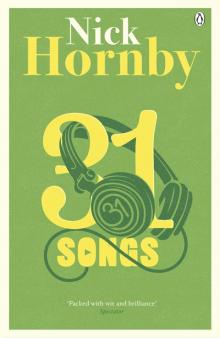 31 Songs
31 Songs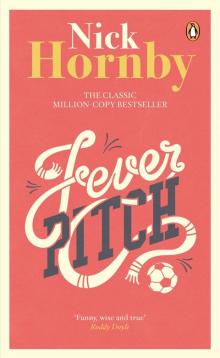 Fever Pitch
Fever Pitch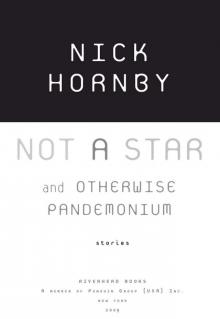 Not a Star and Otherwise Pandemonium
Not a Star and Otherwise Pandemonium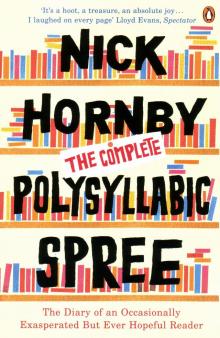 The Complete Polysyllabic Spree
The Complete Polysyllabic Spree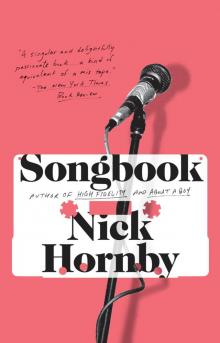 Songbook
Songbook An Education
An Education Slam
Slam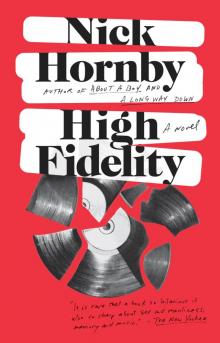 High Fidelity
High Fidelity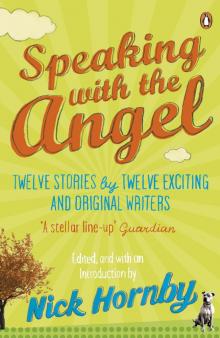 Speaking With the Angel
Speaking With the Angel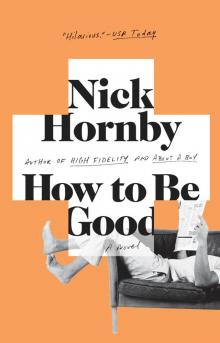 How to Be Good
How to Be Good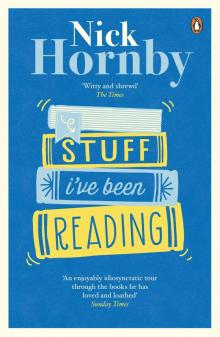 Stuff I've Been Reading
Stuff I've Been Reading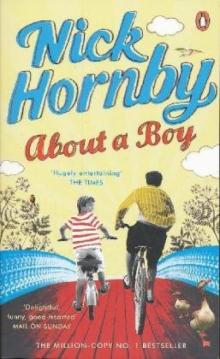 About a Boy
About a Boy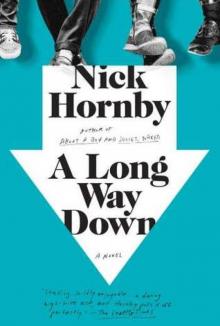 A Long Way Down
A Long Way Down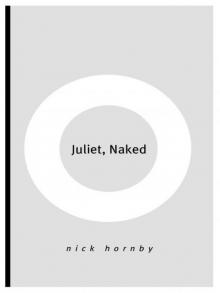 Juliet, Naked
Juliet, Naked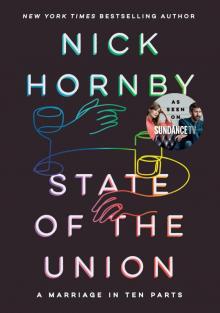 State of the Union
State of the Union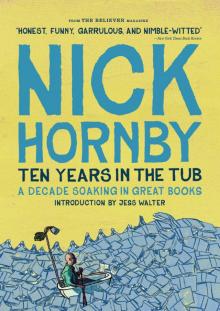 Ten Years in the Tub: A Decade Soaking in Great Books
Ten Years in the Tub: A Decade Soaking in Great Books Books, Movies, Rhythm, Blues: Twenty Years of Writing About Film, Music and Books
Books, Movies, Rhythm, Blues: Twenty Years of Writing About Film, Music and Books Just Like You
Just Like You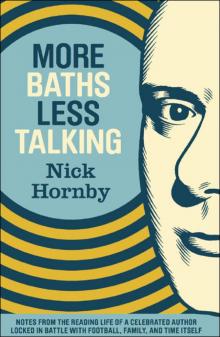 More Baths Less Talking
More Baths Less Talking Books, Movies, Rhythm, Blues
Books, Movies, Rhythm, Blues